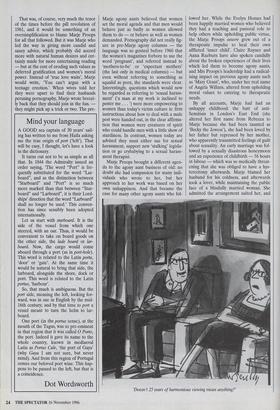Mind your language
A GOOD sea captain of 30 years' sail- ing has written to me from Haifa asking me the true origin of port (`left). That will be easy, I thought, let's have a look in the dictionary.
It turns out not to be as simple as all that. In 1844 the Admiralty issued an order saying, 'The word "Port" is fre- quently substituted for the word "Lar- board", and as the distinction between "Starboard" and "Port" is so much more marked than that between "Star- board" and "Larboard", it is their Lord- ships' direction that the word "Larboard" shall no longer be used.' This conven- tion has since sensibly been adopted internationally.
Let us start with starboard. It is the side of the vessel from which one steered, with an oar. Thus, it would be convenient to take on board goods on the other side, the lade board or lar- board. Now, the cargo would come aboard through a port (as in port-hole). This word is related to the Latin porta, `door' or 'gate'. At the same time it would be natural to bring that side, the larboard, alongside the shore, dock or port. This word is related to the Latin portus, 'harbour'.
So, that much is ambiguous. But the port side, meaning the left, looking for- ward, was in use in English by the mid- 16th century; and by that time to port a vessel meant to turn the helm to lar- board.
One port (in the portus sense), at the mouth of the Tagus, was so pre-eminent in that region that it was called 0 Porto, the port. Indeed it gave its name to the whole country, known in mediaeval Latin as Portus Cale, 'the port of Gaya' (why Gaya I am not sure, but never mind). And from this region of Portugal comes our beloved port wine. This hap- pens to be passed to the left, but that is a coincidence.
Dot Wordsworth


















































































 Previous page
Previous page